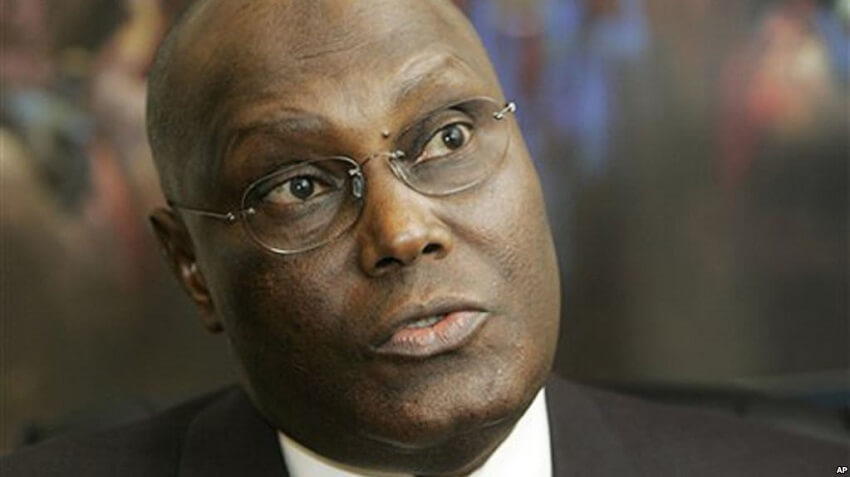FACT CHECK: Is Atiku’s Claim That Nigeria ‘Paid Off Her Entire Foreign Debt’ Under Obasanjo True?
In recent times, the administration of President Muhammadu Buhari and the Presidential Candidate of the Peoples Democratic Party in the 2019 general election, Atiku Abubakar have been engaging in series of argument over the justification of the country’s debt profile.
While members of Buhari’s cabinet had repeatedly claimed that the country is experiencing revenue challenges and as such does not have a debt problem, Atiku who was Nigeria’s former Vice President had called for caution in the accumulation of these debts.
Advertisement
The former vice president had insisted that with the right leadership, the federal government can manage its finances such that it would not require foreign loans to run the country.
Nigeria’s total public debt stock had in recent times been on the increase as a result of the drop in revenue generation.
The debt stock increased from N28.628trn ($79.303bn) as of March 31, 2020 to N31.009trn ($85.897bn) by June 30, 2020, statistics released by the Debt Management has said.
The increase in the debt stock by N2.381trn or $6.593bn was accounted for by the $3.36bn Budget Support Loan from the International Monetary Fund, new domestic borrowing to finance the revised 2020 Appropriation Act including the issuance of the N162.557bn Sukuk, and Promissory Notes issued to settle claims of exporters
Advertisement
Atiku, in a tweet on Friday, claimed that the administration of former president Olusegun Obasanjo, which he served in as Vice President, “paid off” Nigeria’s entire foreign debt within eight years in office.
“Between 1999 and 2007, Nigeria paid off her entire foreign debt while maintaining an unprecedented six per cent annual GDP growth. Those were periods of national restoration, and I am very proud of the work President Obasanjo and I did for this nation we care so much for. Facts don’t lie,” he said.
Following the former Vice President’s claim that the Nigeria “paid off her entire foreign debt,” checks by this newspaper revealed otherwise.
The Facts:
Obasanjo had in April 1999 after his election initiated a relentless campaign for debt relief for the country. The crusade gathered momentum as he went ahead to appoint an economic team led by Okonjo-Iweala to oversee the reform process.
Advertisement
The implementation of the economic reform programme provided the anchor for government’s renewed efforts to persuade the creditors to listen to Nigeria’s case for debt relief.
Nigeria’s vigorous campaign for debt pardon has paid off as some of its creditors under the Paris Club, which have rated the Federal Government’s economic reforms as far-reaching and focused, agreed to write off $18bn or 60 per cent of the $30bn Nigeria owed the cartel.
That is not all. The creditors said that they would go further to raise the amount of the debt to be cancelled to $20bn or 67 per cent.
In a statement conveying the cheering news to the Federal Government, the Paris Club said that in arriving at the debt forgiveness option for Nigeria, it took special cognisance of the economic reform programmes of Obasanjo’s administration.
The creditors said that debt forgiveness measure represents their contribution to Nigeria’s economic development.
“It would also help Nigeria in its fight against poverty,” the creditors said in a statement
Advertisement
Okonjo-Iweala, who had announced the olive branch from the Paris Club in Abuja, said that Nigeria would still be expected to clear the arrears of about $6bn (about 40 per cent) debt to the cartel.
Thereafter, the government would buyback the remainder to provide it an exit from the Paris Club.
“The whole package is such that we can expect debt relief of about 60 to 67 per cent of our current Paris Club debt. We expect to pay off the balance of about 40 per cent through a buy-back option.
“This effort would represent a write-off of between $18bn to $20bn for Nigeria, which compares favourably with the $40bn write-off for 18 low-income heavily indebted countries of which 14 are in Africa.
Following the Paris Club action, the deal was completed on April 21, 2006, when Nigeria made its final payment and its books were cleared of any Paris Club debt.
This means Nigeria under Obasanjo did not pay “off her entire foreign debt,” as claimed by Atiku. What it paid was only $12bn out of the $30bn debt while the balance of $18bn was wiped off under a debt forgiveness arrangement.



